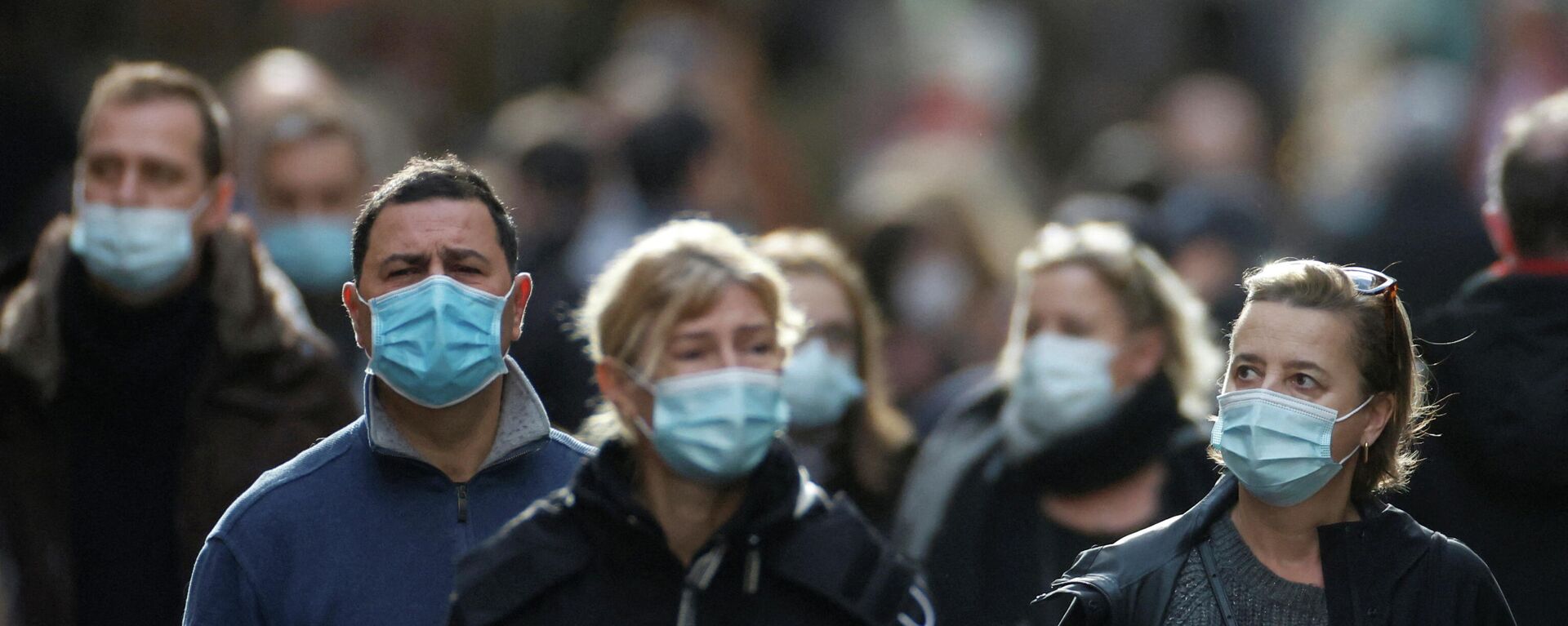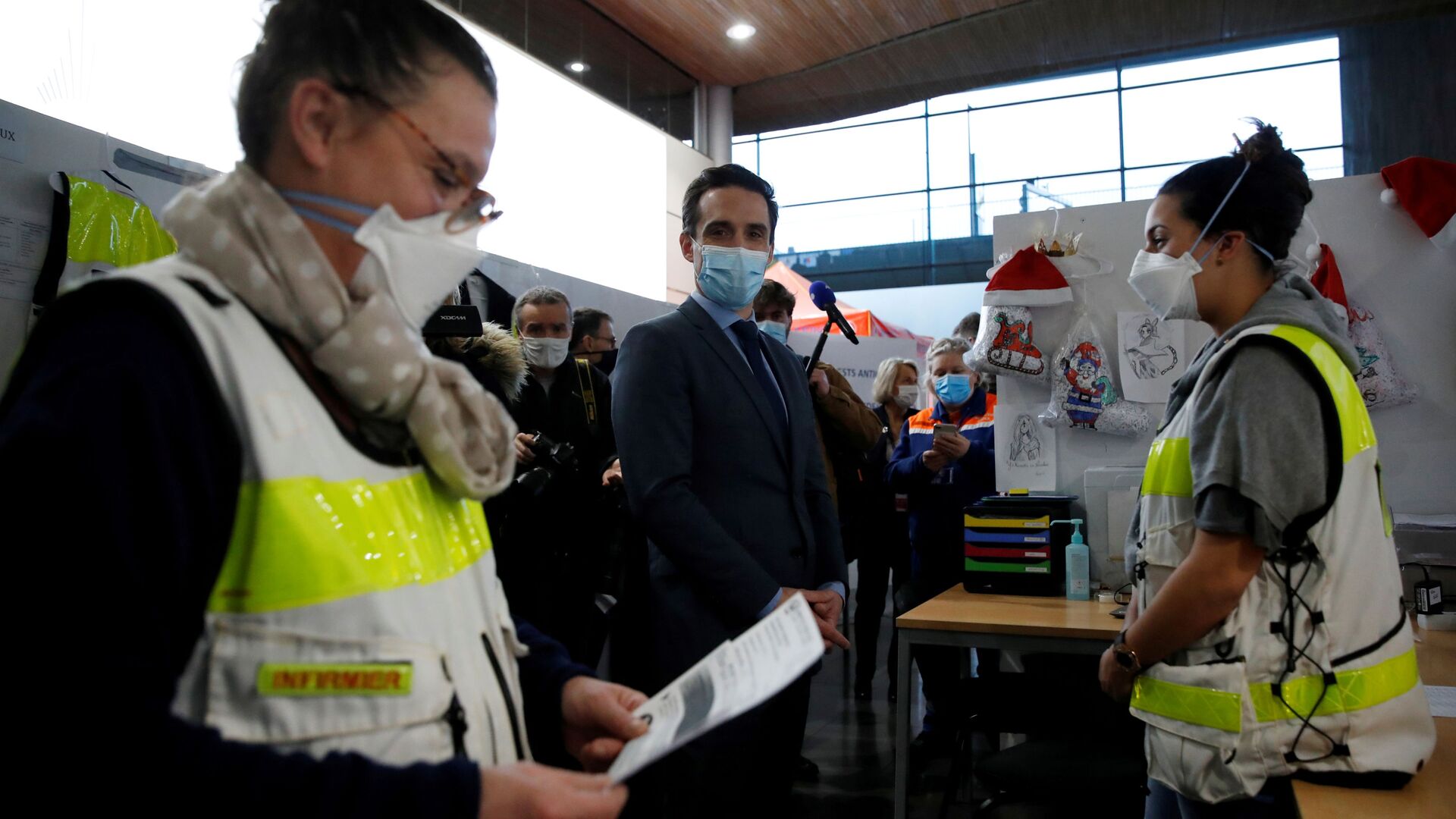https://sputnikglobe.com/20220104/keep-calm-et-continuer-new-covid-variant-found-in-france-not-so-new-after-all-scientists-say-1092020204.html
Keep Calm et Continuer? ‘New’ Covid Variant Found in France Not So New After All, Scientists Say
Keep Calm et Continuer? ‘New’ Covid Variant Found in France Not So New After All, Scientists Say
Sputnik International
Earlier, scientists from France reported on the discovery of a new Sars-Cov-2 strain with 46 mutations, with reporting causing consternation as governments... 04.01.2022, Sputnik International
2022-01-04T19:03+0000
2022-01-04T19:03+0000
2022-01-04T19:34+0000
coronavirus
omicron strain
https://cdn1.img.sputnikglobe.com/img/07e5/02/19/1082189068_0:160:3073:1888_1920x0_80_0_0_7b6f8aba41b897fb2624208d9245b244.jpg
The ‘new’ coronavirus variant B.1.640.2 discovered by scientists at the Méditerranée Infection University Hospital Institute in December is neither new nor that worrisome, epidemiologists and biologists from the UK have suggested.At least a dozen B.1.640.2 cases have been reported in and around Marseille, with ‘patient zero’ being a fully-vaccinated man who tested positive for Covid three days after returning from Cameroon in November and developing “mild respiratory symptoms.”Peacock specified that B.1.640.2 was first uploaded to the GISAID variant-tracking database on 4 November, nearly three weeks before Omicron, which was sequenced on 22 November, and has gone on to be reported in dozens of countries and to have caused tens of thousands of infections.The new variant has yet to be detected beyond France, and has not been labeled a “variant of concern” by the World Health Organization at this time.Dr. Francois Says RelaxDr. Francois Balloux, director of the UCL Genetics Institute, and a professor of computational biology at University College London, echoed his colleague’s sentiment, calling on the public to “relax” and avoid engaging in “fearmongering.”Balloux pointed out that there have been less than 20 cases of the variant sampled so far, with the last collected on 6 December 2021. “It does not explain a spike of cases in Southern France; it has not sent hundreds of people in ICU in France,” Balloux stressed, slapping down suggestions to the contrary by Ding.B.1.640.2’s discovery was first reported on in a paper posted on medRxiv, an internet site distributing as-yet unpublished medical papers. The paper’s authors expressed concerns that the variant’s 46 mutations could make it more transmissible or even vaccine-resistant.The variant’s discovery comes as governments around the world continue to take measures against Omicron, or B.1.1.529 – the infectious but mild Covid variant which wreaked havoc on many countries’ holiday plans despite assurances by the South African doctor who discovered it that it was “extremely mild” compared to other variants, including Delta. Since Omicron's discovery, scientists including Dr. John Campbell have reported that the virus typically presents with symptoms similar to a cold, including scratchy cough, fatigue and muscle pain.
https://sputnikglobe.com/20220104/worrying-new-covid-19-strain-with-46-mutations-found-in-france-may-be-more-jab-resistant-1092007731.html
https://sputnikglobe.com/20220102/omicron-more-apt-at-sidestepping-immunity-though-less-contagious-than-feared--danish-study-1091972472.html
Sputnik International
feedback@sputniknews.com
+74956456601
MIA „Rosiya Segodnya“
2022
News
en_EN
Sputnik International
feedback@sputniknews.com
+74956456601
MIA „Rosiya Segodnya“
Sputnik International
feedback@sputniknews.com
+74956456601
MIA „Rosiya Segodnya“
coronavirus, omicron strain
coronavirus, omicron strain
Keep Calm et Continuer? ‘New’ Covid Variant Found in France Not So New After All, Scientists Say
19:03 GMT 04.01.2022 (Updated: 19:34 GMT 04.01.2022) Earlier, scientists from France reported on the discovery of a new Sars-Cov-2 strain with 46 mutations, with reporting causing consternation as governments worldwide continue to enact new restrictions to fight Omicron, a Covid-19 variant said to be more infectious but far less severe than its predecessors.
The ‘new’ coronavirus variant B.1.640.2 discovered by scientists at the Méditerranée Infection University Hospital Institute in December is neither new nor that worrisome, epidemiologists and biologists from the UK have suggested.
At least a dozen B.1.640.2 cases have been reported in and around Marseille, with ‘patient zero’ being a fully-vaccinated man who tested positive for Covid three days after returning from Cameroon in November and developing “mild respiratory symptoms.”
Dr. Thomas Peacock, a virologist at Imperial College London’s department of infectious disease, called on the public to keep calm and carry on in a
Twitter thread Tuesday, pointing out that the ‘new’ variant actually “predates Omicron,” and is “definitely not one worth worrying about too much at the moment.”
Peacock specified that B.1.640.2 was first uploaded to the GISAID variant-tracking database on 4 November, nearly three weeks before Omicron, which was sequenced on 22 November, and has gone on to be reported in dozens of countries and to have caused tens of thousands of infections.
“This virus [B.1.640.2] has had a decent chance to cause trouble but never really materialized (as far as we can tell at least),” Peacock assured.
The new variant has yet to be detected beyond France, and has not been labeled a “variant of concern” by the World Health Organization at this time.
Dr. Francois Balloux, director of the UCL Genetics Institute, and a professor of computational biology at University College London, echoed his colleague’s sentiment, calling on the public to “relax” and avoid engaging in “fearmongering.”
“In case anyone came across tweets by @DrEricDing or other ‘variant fear mongers’ who, possibly disappointed by Omicron, are announcing the new variant from hell (B.1.640.2), please relax for now,” Balloux urged, referring to recent tweets on the new variant from US health economist Eric Feigl-Ding.
Balloux pointed out that there have been less than 20 cases of the variant sampled so far, with the last collected on 6 December 2021. “It does not explain a spike of cases in Southern France; it has not sent hundreds of people in ICU in France,” Balloux stressed, slapping down
suggestions to the contrary by Ding.
B.1.640.2’s discovery was first
reported on in a paper posted on medRxiv, an internet site distributing as-yet unpublished medical papers. The paper’s authors expressed concerns that the variant’s 46 mutations could make it more transmissible or even vaccine-resistant.

4 January 2022, 05:28 GMT
The variant’s discovery comes as governments around the world continue to take measures against Omicron, or B.1.1.529 – the infectious but mild Covid variant which wreaked havoc on many countries’ holiday plans despite assurances by the South African doctor who discovered it that it was
“extremely mild” compared to other variants, including Delta. Since Omicron's discovery, scientists including Dr. John Campbell
have reported that the virus typically presents with symptoms similar to a cold, including scratchy cough, fatigue and muscle pain.

2 January 2022, 06:03 GMT





